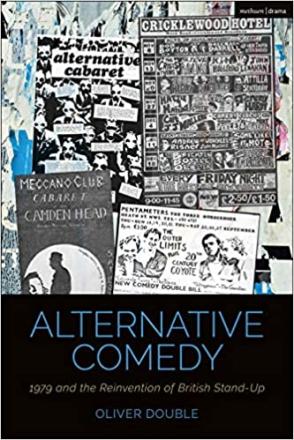
When I saw that Oliver Double’s new book about Alternative Comedy was £75 I assumed it was a massive doorstep tome that the postperson would never be able to carry. So I was surprised when (thank you Bloomsbury Press Office) a relatively thin 200-ish page hardback dropped through my letterbox.
But what Double’s book lacks in word count it more than makes up for in density of thought. There have already been books about the history of alternative comedy, but this is the definitive account. The word 'forensic' has been bandied about a bit recently in other contexts but Double really does take a forensic look at where 'altcom' came from, what it was like and where it is going.
He is in a good place to do it. As a reader in Drama at the University of Kent he has access to the uni’s large Stand Up Archive, which means he knows, for instance, how much Arnold Brown got for a gig in 1980 because he has seen the promoter’s handwritten notebook. He also has access to early filmed/recorded material so has been able to reassemble comedy sets and gigs that nobody can remember (I was there at the time and I think I’m quoted just once in the book – I was enjoying altcom so much as a young fan I forgot almost all of it).
I should also add that the book is not a dry academic thesis, it’s very funny too, with routines and gags liberally quoted throughout. I bet there are a lot more laughs here than in another book in the same Methuen series, The Polish Theatre of the Holocaust.
Much of the story will be familiar to students of comedy – how London’s Comedy Store fortuitously opened within weeks of Margaret Thatcher being elected in 1979, for instance. But Double digs further back, to explore its roots and influences, from American authored comedians such as Mort Sahl and Lenny Bruce to storytelling folkies Billy Connolly and Jasper Carrott. I'm not sure how valid the subtitle about reinventing British stand-up is, but then maybe Double isn't either, as he also cites plenty of precedents for altcom.
There are tantalising examples here of the odd characters who were ahead of their time but because they were outliers did not kick start a movement. Double recalls John Paul Joans, a hippyish stand-up who went against the Working Men’s Club grain in the early 1970s and never broke through. Or John Dowie, who the book suggests might have been a big star rather than a cult act had he come along a handful of years later when the world was ready for his mix of honesty and oddness.
It is amazing how movements start. Ironically Double quotes George Melly saying it’s about enough germs being able to gather together to spread an epidemic. It happened with punk and a couple of years later – thanks in part to the punk DIY ethos – it happened again with comedy.
The meat of the story is the history of two different factions around 1979 – the Comedy Store, with Mayall, Edmondson, Planer, Richardson etc, and The Alternative Cabaret gang led - if an anarchist can lead – by Tony Allen. Some – Alexei Sayle, Keith Allen - overlapped. Ego and ambition probably caused splits and factionalism as much as ideology. There was a point where either group could have been major stars, but it was the former rather than the latter that got the biggest TV breaks.
Was this group more pliable? More talented? More prepared to compromise? Just in the right place to be spotted by the right people? It is one of the ironies of alternative comedy that while it is remembered here for ushering in an era of non-sexist, non-racist stand-up that still lives on today many of the early stars – Mayall, Edmondson and many more (mainly white, male) that ended up in The Young Ones and C4’s Comic Strip, were not really stand-ups at all but actors.
Double takes us through all the main points of the 1980s boom and throws up some interesting contrasts. While we think of the Edinburgh Fringe as being a place where comics go to lose money, in 1980 Tony Allen’s Alternative Cabaret group did a ten-night run and pocketed the equivalent of nearly £1500 profit each. And I bet their accommodation was cheaper than it would be today.
If you’ve got even a passing interest in the history of modern comedy Double’s book is a must. There is a cheaper ebook version and it might come out in paperback at a later date, but otherwise libraries will hopefully stock plenty of copies.
Buy Alternative Comedy here.



